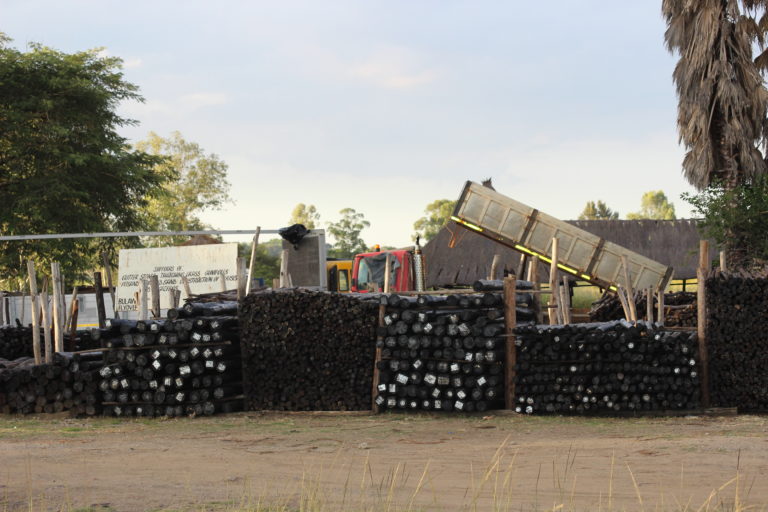MUTARE — At first, it was a dense timber forestry. Then came the 2000 land reform program at the advent of 76-year old Obson Nyahanga into the picture, taking over the once-thriving timber plantation. Now, the 140-hectare timber plantation has over the past few years become a shadow of its former self.
This does not worry Nyahanga an inch, however, surprisingly.
“What is important is that I now own the land which we fought for during the war. Why should you be worried about what is on my land?” said Nyahanga.
He (Nyahanga) is a veteran who fought in the war against British colonial rule during the 1970s liberation war.
Irked by their deteriorating standards of living, thousands of Zimbabwean war veterans like Nyahanga around the year 2000 stormed the country’s once-thriving white-owned commercial farms like the timber plantation he (Nyahanga) occupies to this day in the country’s Manicaland Province.
But, Nyahanga’s touch on the timber plantation was a disastrous one, which to this day has left no single tree standing.

Yet, Zimbabwe’s liberation war heroes like him (Nyahanga) still pride themselves even as they are not making meaningful developments on the farms they seized.
“How we use our land which we took back from the white oppressors should not bother anyone; I have used the timber here the way I wanted, even as firewood at times and that has satisfied me and I still own the land even as there is no more timber,” he (Nyahanga) said.
With many Zimbabweans like Nyahanga apparently unconcerned about the state of the country’s forests, Zimbabwe’s timber plantations are fast being rendered extinct, with officials from the country’s Forestry Commission protesting without any response from the culprits responsible for unleashing destruction on the country’s forests.

As such, Zimbabwe loses about 330,000 hectares (815,450 acres) of forests annually, according to Forestry Commission spokesperson Violet Makoto.
Soon, if not very soon, officials foresee Zimbabwe being reduced to an importer of timber.
In fact, last year in March, Zimbabwe’s Forestry Commission general manager Abednigo Marufu told parliament that unrestrained deforestation would see Zimbabwe importing timber by 2030.
Last year, Zimbabwe’s timber declined from 120,000 to 70,000 hectares due to illegal settlers on timber plantations, miners, veld fires and the chaotic land reform program, according to Timber Producers Federation.

The Forestry Commission is a parastatal under Zimbabwe’s Ministry of Environment, Tourism and Hospitality Industry, with the commission contributing to national socio-economic development through regulation and capacity enhancement in the utilization and management of forest resources.
And so as much timber keeps being lost, environmental activists like Tony Hurudza based in Harare the Zimbabwean capital, said ‘there seem to be no respite nor efforts being made to replenish the vandalized tree plantations.’
“War veterans occupying some of the once-thriving timber forests even boast of using the timber as firewood, saying it’s theirs and nobody can ask them,” said Hurudza.
Sounding rather stubborn, Nyahanga even said ‘we don’t eat timber and therefore we have to clear more land for agriculture to prepare for each farming season.’
So, consequently, timber forests are fading fast, with it (timber) now being added to a list of commodities running short countrywide for many who depend on it like carpenters, for instance.
“It’s not easy to find timber these days because suppliers always say they don’t have stock,” Naison Gombe, a carpenter based in Harare, said.
An estimated 70 percent of Zimbabwe’s population of 16 million people reside in remote areas without electricity, with many having to turn to firewood for cooking, adding a strain on the country’s dwindling timber forests.

Meanwhile, forest and woodland resources now cover 45 percent of Zimbabwe’s land area, down from 53 percent in 2014, according to the Forestry Commission.
To Makoto of the Forestry Commission, ‘this is a pointer to major deforestation’.
But, she (Makoto) also said under Zimbabwe’s Forest Act, anyone who cuts, damages, destroys, collects, takes or removes trees or timber without a license faces a fine of about 100 dollars or two years in prison.
However, the bulk of resettled farmers who are war veterans, even with the Forest Act in place, they remain untouchable, according to civil society leaders.
“No police nor authority can stand up to war veterans who are plundering timber plantations here because they will be terrorized by these resettled farmers who claim they personally own this country,” said Claris Madhuku, director of the Platform for Youth Development, a civic society organization in Zimbabwe.
















